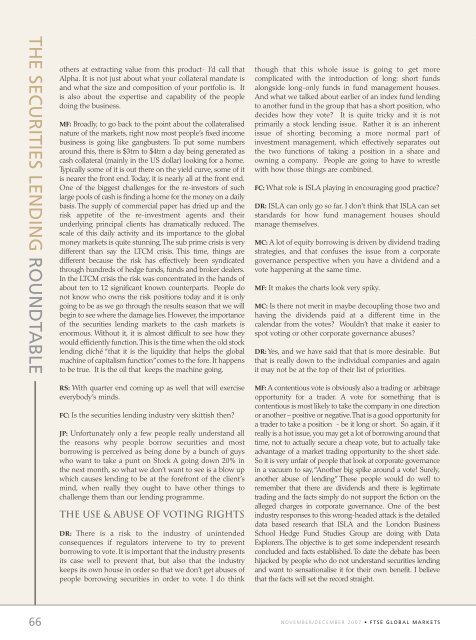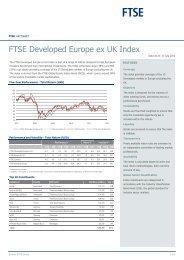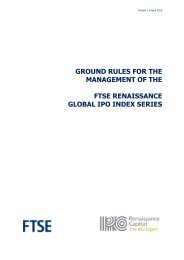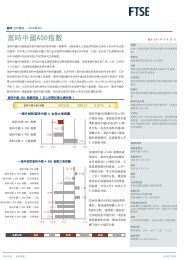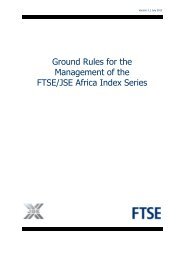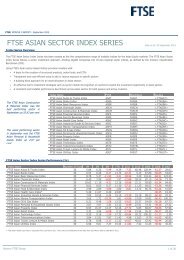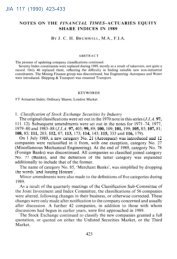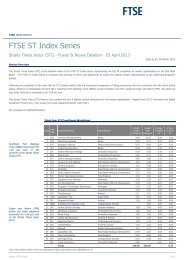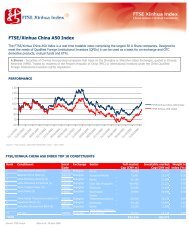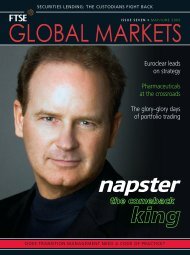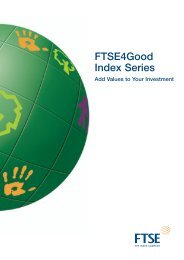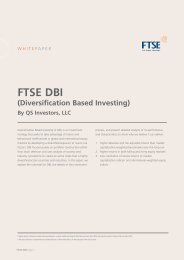Section 2 - FTSE
Section 2 - FTSE
Section 2 - FTSE
Create successful ePaper yourself
Turn your PDF publications into a flip-book with our unique Google optimized e-Paper software.
THE SECURITIES LENDING ROUNDTABLE<br />
66<br />
others at extracting value from this product- I’d call that<br />
Alpha. It is not just about what your collateral mandate is<br />
and what the size and composition of your portfolio is. It<br />
is also about the expertise and capability of the people<br />
doing the business.<br />
MF: Broadly, to go back to the point about the collateralised<br />
nature of the markets, right now most people’s fixed income<br />
business is going like gangbusters. To put some numbers<br />
around this, there is $3trn to $4trn a day being generated as<br />
cash collateral (mainly in the US dollar) looking for a home.<br />
Typically some of it is out there on the yield curve, some of it<br />
is nearer the front end. Today, it is nearly all at the front end.<br />
One of the biggest challenges for the re-investors of such<br />
large pools of cash is finding a home for the money on a daily<br />
basis. The supply of commercial paper has dried up and the<br />
risk appetite of the re-investment agents and their<br />
underlying principal clients has dramatically reduced. The<br />
scale of this daily activity and its importance to the global<br />
money markets is quite stunning. The sub prime crisis is very<br />
different than say the LTCM crisis. This time, things are<br />
different because the risk has effectively been syndicated<br />
through hundreds of hedge funds, funds and broker dealers.<br />
In the LTCM crisis the risk was concentrated in the hands of<br />
about ten to 12 significant known counterparts. People do<br />
not know who owns the risk positions today and it is only<br />
going to be as we go through the results season that we will<br />
begin to see where the damage lies. However, the importance<br />
of the securities lending markets to the cash markets is<br />
enormous. Without it, it is almost difficult to see how they<br />
would efficiently function.This is the time when the old stock<br />
lending cliché “that it is the liquidity that helps the global<br />
machine of capitalism function”comes to the fore. It happens<br />
to be true. It is the oil that keeps the machine going.<br />
RS: With quarter end coming up as well that will exercise<br />
everybody’s minds.<br />
FC: Is the securities lending industry very skittish then?<br />
JP: Unfortunately only a few people really understand all<br />
the reasons why people borrow securities and most<br />
borrowing is perceived as being done by a bunch of guys<br />
who want to take a punt on Stock A going down 20% in<br />
the next month, so what we don’t want to see is a blow up<br />
which causes lending to be at the forefront of the client’s<br />
mind, when really they ought to have other things to<br />
challenge them than our lending programme.<br />
THE USE & ABUSE OF VOTING RIGHTS<br />
DR: There is a risk to the industry of unintended<br />
consequences if regulators intervene to try to prevent<br />
borrowing to vote. It is important that the industry presents<br />
its case well to prevent that, but also that the industry<br />
keeps its own house in order so that we don’t get abuses of<br />
people borrowing securities in order to vote. I do think<br />
though that this whole issue is going to get more<br />
complicated with the introduction of long: short funds<br />
alongside long-only funds in fund management houses.<br />
And what we talked about earlier of an index fund lending<br />
to another fund in the group that has a short position, who<br />
decides how they vote? It is quite tricky and it is not<br />
primarily a stock lending issue. Rather it is an inherent<br />
issue of shorting becoming a more normal part of<br />
investment management, which effectively separates out<br />
the two functions of taking a position in a share and<br />
owning a company. People are going to have to wrestle<br />
with how those things are combined.<br />
FC: What role is ISLA playing in encouraging good practice?<br />
DR: ISLA can only go so far. I don’t think that ISLA can set<br />
standards for how fund management houses should<br />
manage themselves.<br />
MC: A lot of equity borrowing is driven by dividend trading<br />
strategies, and that confuses the issue from a corporate<br />
governance perspective when you have a dividend and a<br />
vote happening at the same time.<br />
MF: It makes the charts look very spiky.<br />
MC: Is there not merit in maybe decoupling those two and<br />
having the dividends paid at a different time in the<br />
calendar from the votes? Wouldn’t that make it easier to<br />
spot voting or other corporate governance abuses?<br />
DR: Yes, and we have said that that is more desirable. But<br />
that is really down to the individual companies and again<br />
it may not be at the top of their list of priorities.<br />
MF: A contentious vote is obviously also a trading or arbitrage<br />
opportunity for a trader. A vote for something that is<br />
contentious is most likely to take the company in one direction<br />
or another – positive or negative.That is a good opportunity for<br />
a trader to take a position - be it long or short. So again, if it<br />
really is a hot issue, you may get a lot of borrowing around that<br />
time, not to actually secure a cheap vote, but to actually take<br />
advantage of a market trading opportunity to the short side.<br />
So it is very unfair of people that look at corporate governance<br />
in a vacuum to say,“Another big spike around a vote! Surely,<br />
another abuse of lending” These people would do well to<br />
remember that there are dividends and there is legitimate<br />
trading and the facts simply do not support the fiction on the<br />
alleged charges in corporate governance. One of the best<br />
industry responses to this wrong-headed attack is the detailed<br />
data based research that ISLA and the London Business<br />
School Hedge Fund Studies Group are doing with Data<br />
Explorers. The objective is to get some independent research<br />
concluded and facts established. To date the debate has been<br />
hijacked by people who do not understand securities lending<br />
and want to sensationalise it for their own benefit. I believe<br />
that the facts will set the record straight.<br />
NOVEMBER/DECEMBER 2007 • <strong>FTSE</strong> GLOBAL MARKETS


